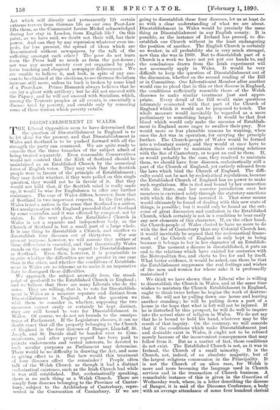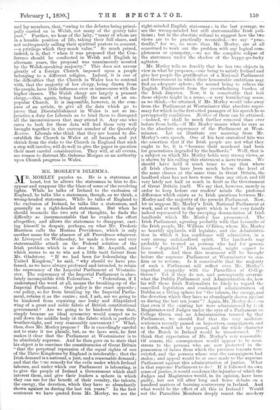DISESTA.BLISHMENT IN WALES.
THE Liberal Opposition seem to have determined that the question of Disestablishment in England is to be let alone for the present, and that Disestablishment in Wales and Scotland is to be pushed forward with all the strength the party can command. We are quite ready to concede that the three branches of the subject admit of being treated separately. Even reasonable Conservatives would not contend that the Kirk of Scotland should be maintained as an Established Church by the numerical force of English votes. They may -wish that the Scottish people were in favour of the principle of Establishment ; they may doubt whether, if they were polled on this single question, they would not be in favour of it. But they would not hold that, if the Scottish mind, is really made up, it would be wise for Englishmen to offer any further resistance. The case of Wales differs, however, from that of Scotland in two important respects. In the first place, Wales is not a nation in the sense that Scotland is a nation. Her amalgamation with England preceded that of Scotland by some centuries, and it was effected by conquest, not by union. In the next place, the Established Church in Wales is not a separate and independent body, as the Church of Scotland is, but a small part of a large whole. It is one thing to disestablish a Church, and another to disestablish four dioceses out of thirty-two. For our present purpose, however, we will assume that neither of theSe differences is essential, and that theoretically Wales stands on the same footing in regard to Disestablishment as Scotland. Even then, however, it is permissible to inquire whether the difficulties are not greater in one case than in the other, and whether the conditions of Establish- ment in Wales are so irksome as to make it an imperative duty to disregard these difficulties. We approach the subject avowedly from the stand- point of good-will to the Established Church in England ; and we believe that there are many Liberals who do the same. They are willing, that is, to vote for Disestablish- ment in Wales as a measure separate and distinct from Disestablishment in England. And the question we wish them to consider is, whether, supposing the two measures cannot easily or certainly be kept distinct, they are still bound to vote for Disestablishment in Wales. Of course, we do not set bounds to the omnipo- tence of Parliament. If the Legislature chooses, it can no doubt enact that all the property belonging to the Church of England in the four dioceses of Bangor, Llandaff, St. Asaph, and St. Davids shall be handed over to Com- missioners, and after proper regard has been paid to private endowments and vested interests, be devoted to such secular purposes as Parliament may determine. There would be no difficulty in drawing the Act, and none in giving effect to it. But how would this treatment of four dioceses affect the remainder ? People often talk of the Welsh Church as though it had a distinct ecclesiastical existence, such as the Irish Church had while it was still established. But, ecclesiastically speaking, there is no such thing as a Welsh Church. There are simply four dioceses belonging to the Province of Canter- bury, subject to the Archbishop of Canterbury, repre- sented in the Convocation of Canterbury. If we are going to disestablish these four dioceses, let us at least do so with a clear understanding of what we are about. Disestablishment in Wales would be precisely the same thing as Disestablishment in any English county. It is possible, as the instance of Ireland has proved, to dis- establish one Church without in the least endangering the position of another. The English Church is certainly no weaker, in all probability she is very much stronger, now than she was in 1869. But to disestablish part of a Church is a work we have not yet put our hands to, and the conclusions drawn from the Irish experiment will not necessarily apply in Wales. It would be very difficult to keep the question of Disestablishment out of the discussion, whether on the second reading of the Bill or in Committee. One Liberationist Member after another would rise to plead that in this or that diocese in England, the conditions sufficiently resemble those of the Welsh dioceses to make similar treatment just and appro- priate. Every detail of the Bill would raise questions intimately connected with that part of the Church of England which it would not be proposed to touch. The whole measure would inevitably be regarded as a mere preliminary to something larger. It would be that first blood which would only make the enemies of Establish- ment in England more eager to swallow their prey. Nor would more or less plausible reasons be wanting, when once the Act was in operation, for carrying the principle further. The Church-people of Wales would be formed into a voluntary society, and they would at once have to determine whether to maintain their existing relations with the See of Canterbury, or to put an end to them. If, as would probably be the case, they resolved to maintain them, we should have four dioceses, ecclesiastically still a part of the Church of England, yet entirely released from the laws which bind the Church of England. The diffi- culty could not be met by ecclesiastical regulations, because the Established Church of England has no power to make such regulations. She is tied and bound by her connection with the State, and her coercive jurisdiction over her members is exercised solely through the statutory sanctions with which the State has invested it. That some means would ultimately be found of dealing with this new state of things, is possible; but it would only be found as the out- come of great discussion and confusion in the Established Church, which certainly is not in a condition to bear easily any new elements of this character. If, on the other hand, the Church-people of Wales elected to have no more to do with the See of Canterbury than any Colonial Church has, it would inevitably be argued that the ecclesiastical frame- work of the Church of England is only kept in being because it belongs to her in her character of an Establish- ment. The moment a diocese is disestablished, it puts an end to the relations which have existed for centuries with the Metropolitan See, and elects to live for and by itself. What better evidence, it would be asked, can there be that the Establishment suppresses the real feelings and wishes of the men and women for whose sake it is professedly maintained ?
We think we have shown that a Liberal who is willing to disestablish the Church in Wales, and at the same time wishes to maintain the Church Establishment in England, ought to think twice before he begins the work of destruc- tion. He will not be pulling down one house and leaving another standing ; he will be pulling down a part of a house in the hope that what is left will not be injured. If he is disturbed by this prospect, he will do well to inquire into the actual state of religion in Wales. We do not say that he is bound to hold his hand, whatever may be the result of that inquiry. On the contrary, we will concede that if the conditions which make Disestablishment just and desirable exist in Wales, it ought not to be refused merely because of the inconvenient consequences that may follow from it. But as a matter of fact, these conditions do not exist. The Established Church is not, as it was in Ireland, the Church of a small minority. It is the Church, not, indeed, of an absolute majority, but of the largest religious communion in the Principality. It is not the Church of an alien race, for Welsh is more and more becoming the language used in Church services and in the transaction of Church business. A remarkable instance of this is given in the Guardian of Wednesday week, where, in a letter describing the diocese of Bangor, it is said of the Diocesan Conference, a body with an average attendance of some four hundred clerical and lay members, that, "owing to the debates being princi- pally carried on in Welsh, not many of the gentry take part." Further, we hear of the laity, "many of whom are in a humble position of life, taking their full share, and not unfrequently calling their spiritual pastors to account, —a privilege which they much value." So much prized, indeed, is it, that "when it was proposed that the Con- ference should be conducted in Welsh and English in alternate years, the proposal was unanimously scouted by the Welsh-speaking majority." This does not savour greatly of a foreign Church imposed upon a people belonging to a different religion. Indeed, it is one of the difficulties that the Church in Wales has to contend with, that the majority of her clergy, being drawn from the people, have little influence over or intercourse with the higher classes. The Welsh clergy are largely a peasant clergy,—this, again, being hardly the mark of an un- popular Church. It is impossible, however, in the com- pass of an article, to give all the data which go to prove that Disestablishment in Wales is not so im- perative a duty for Liberals as to bind them to disregard all the inconveniences that may attend it. Any one who cares to look for these data will find them very well brought together in the current number of the Quarterly Review. Liberals who think that they are bound to dis- establish the Church in Wales at all hazards, and yet shrink from the risks to the Church in England that such a step will involve, will do well to give the paper in question their most careful consideration. They will, at all events, see reason to distrust Mr. Osborne Morgan as an authority upon Church progress in Wales.



































 Previous page
Previous page